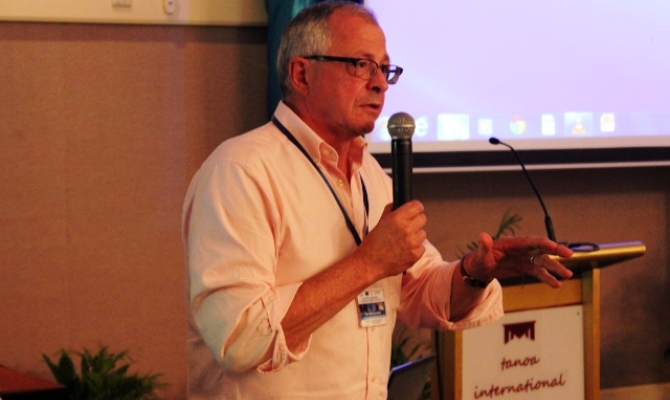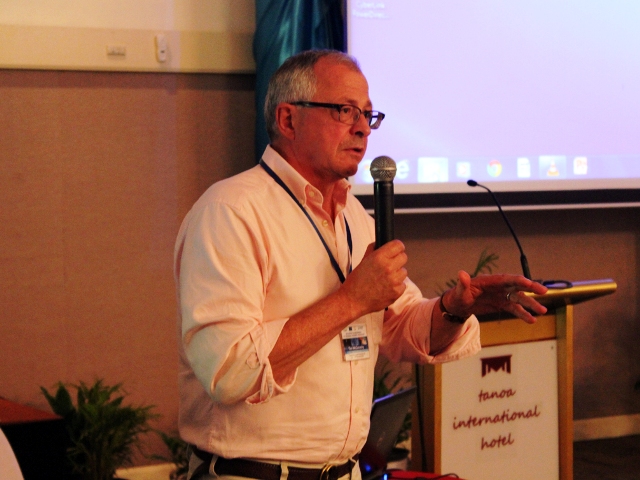
Island and Ocean Ecosystems
Steve Pogonowski, 12 December 2013, Suva Fiji - Regional cooperation on establishing rules and regulations for deep sea mining could help overcome limited capacity in smaller countries, attendees heard at the 4th Regional Training Workshop: Environmental Perspectives of Deep Sea Mineral Activities in Nadi, Fiji.
Speakers also presented their findings and opinions on the potential Impacts of deep sea mining on fisheries, global deep sea conservation initiatives and waste dumping concerns.
Secretariat of the Pacific Community legal adviser Hannah Lily discussed relevant international law and the development of national legal frameworks for deep sea mining in the Pacific region.
"It is very important for Pacific Island countries to finalise their maritime boundaries before issuing DSM licenses," Ms Lily said.
"We need to think about how we can pool resources in a regional manner to build countries' ability to regulate these (potential mining) areas."
She said the International Seabed Authority, charged with administering resources in the seabed beyond the limits of national jurisdiction (the Area), should work with member countries to ensure the best environmental outcomes.
Dr Malcolm Clark, Principal Scientist at New Zealand's National Institute of Water and Atmospheric Research (NIWA), spoke on the importance of seamounts as 'biodiversity hotspots' and key targets in the Pacific for deepwater snapper, grouper and bluenose fisheries.
He said bottom trawling had been shown to destroy slow-growing corals on seamounts and mining could potentially introduce choking sediment plumes that would reduce productivity on seamounts.
Representatives from Papua New Guinea, Fiji, Tonga and the Cook Islands gave their views on their current gaps in capacity to deal with deep sea mining.
Gretel Orake from Papua New Guinea said her country had approved the world's first deep sea mining operation, Solwara 1, in line with the government's Vision 2050 plan to double mining income by 2030.

Speakers also presented their findings and opinions on the potential Impacts of deep sea mining on fisheries, global deep sea conservation initiatives and waste dumping concerns.
Secretariat of the Pacific Community legal adviser Hannah Lily discussed relevant international law and the development of national legal frameworks for deep sea mining in the Pacific region.
"It is very important for Pacific Island countries to finalise their maritime boundaries before issuing DSM licenses," Ms Lily said.
"We need to think about how we can pool resources in a regional manner to build countries' ability to regulate these (potential mining) areas."
She said the International Seabed Authority, charged with administering resources in the seabed beyond the limits of national jurisdiction (the Area), should work with member countries to ensure the best environmental outcomes.
Dr Malcolm Clark, Principal Scientist at New Zealand's National Institute of Water and Atmospheric Research (NIWA), spoke on the importance of seamounts as 'biodiversity hotspots' and key targets in the Pacific for deepwater snapper, grouper and bluenose fisheries.
He said bottom trawling had been shown to destroy slow-growing corals on seamounts and mining could potentially introduce choking sediment plumes that would reduce productivity on seamounts.
Representatives from Papua New Guinea, Fiji, Tonga and the Cook Islands gave their views on their current gaps in capacity to deal with deep sea mining.
Gretel Orake from Papua New Guinea said her country had approved the world's first deep sea mining operation, Solwara 1, in line with the government's Vision 2050 plan to double mining income by 2030.

Tim McConachy presenting to the meeting
A panel discussion captured the views of academics, NGOs and the private sector. Neptune Minerals senior vice-president of science and exploration, Tim McConachy, said companies were spending vast sums of money on exploration of prospective mining sites and the scientific knowledge gained from that process was invaluable.
A panel discussion captured the views of academics, NGOs and the private sector. Neptune Minerals senior vice-president of science and exploration, Tim McConachy, said companies were spending vast sums of money on exploration of prospective mining sites and the scientific knowledge gained from that process was invaluable.